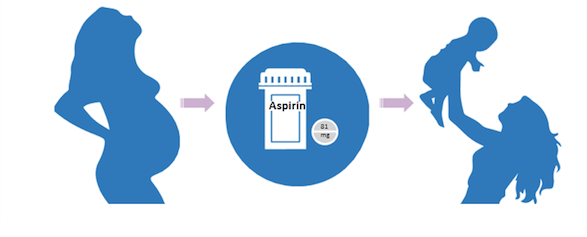Prenatal Aspirin Project

Racial and ethnic differences in pregnancy outcomes are amongst the most persistent health inequities in the United States. Hypertension in pregnancy with subsequent preterm birth, one of the leading causes of poor or fatal maternal and fetal complications, disproportionately affects Black women. At Boston Medical Center, pregnant Black women are three times as likely to have a hypertensive complication compared to White women.
In 2014 the United States Preventative Services Task Force recommended the use of Low Dose Aspirin (81mg, or “Prenatal Aspirin”) to women who have risk factors for hypertension in pregnancy. Such risk factors include chronic hypertension, Type 1 or 2 diabetes, obesity, a history of preeclampsia, and more. They also suggested considering prenatal aspirin if a woman has several moderate risk factors including first pregnancy, advanced maternal age, obesity, and numerous socio-demographic factors. The USPSTF Systematic Review found when prenatal aspirin is started in the first trimester in at-risk women, it reduced the incidence of hypertension by 24%, preterm birth by 14%, and intrauterine growth restriction by 20%. Crucially, the meta-analysis based on 19 RCTs did not identify any increased risk of harm from taking PNA .
The Prenatal Aspirin Project at Boston Medical Center is a Quality Improvement initiative that aims to increase awareness and education of aspirin during pregnancy. Our 2018 goals include increasing prescription rates for all at-risk women to 90%, while engaging with pharmacists, patients, and community stakeholders to increase acceptance of prenatal aspirin.
To learn more about the Prenatal Aspirin Project check out our website.
Or you can check out our Podcast here
Contact Information
Dr. Nyia Noel
Interim Project Manager
Email: Nyia.Noel@bmc.org